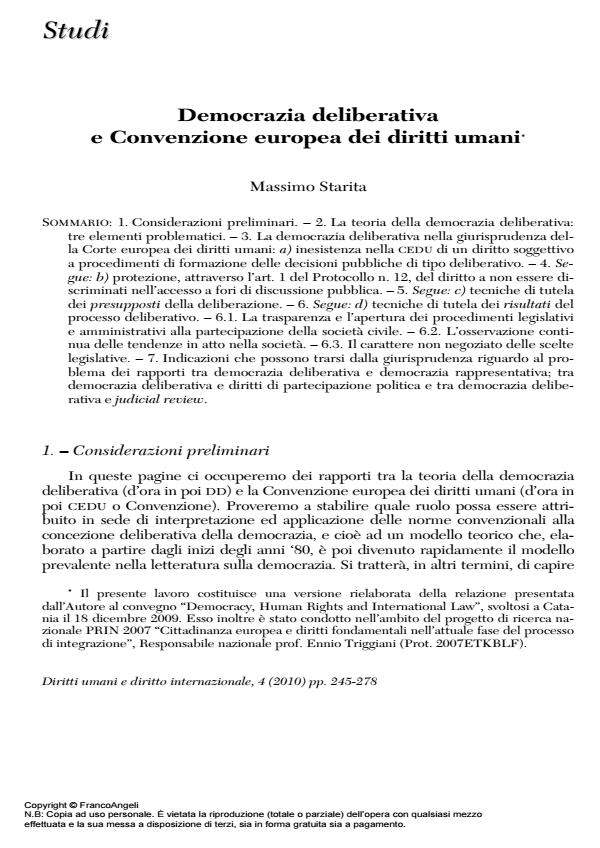Deliberative democracy and the European Convention on Human Rights
Journal title DIRITTI UMANI E DIRITTO INTERNAZIONALE
Author/s Massimo Starita
Publishing Year 2010 Issue 2010/2
Language Italian Pages 34 P. 245-278 File size 567 KB
DOI 10.3280/DUDI2010-002001
DOI is like a bar code for intellectual property: to have more infomation
click here
Below, you can see the article first page
If you want to buy this article in PDF format, you can do it, following the instructions to buy download credits

FrancoAngeli is member of Publishers International Linking Association, Inc (PILA), a not-for-profit association which run the CrossRef service enabling links to and from online scholarly content.
Theories of deliberative democracy have rapidly become very popular amongst political scientists. The central argument of these theories is that democratic legitimacy of lawmaking does not lie (or does not only lie) in the elected character of Parliaments but in public deliberation processes. Decisions have to be justified by reasons and reasons have to be publicly debated. Legitimacy also depends on the opportunity for citizens to participate effectively in public debates. In this paper I argue that the European Court of Human Rights can be a key player in promoting a democracy based on public deliberation and that in the last decade the Court has been influenced by this conception of legitimate government. First, I suggest that the Court has promoted political debate by establishing the principle that freedom of expression deserves a higher degree of protection, if it claims to be in the public interest. Second, the Court has also been able to protect the outcome of a deliberative process. In deciding whether or not the State’s interference with an individual’s right is "necessary in a democratic society", the Court has recently given a certain importance to the deliberative character of a national measure. However this has happened in areas where the State’s margin of appreciation is wide. Furthermore, the analysis also considers how the Court has dealt with three critical questions in the theory of deliberative democracy, namely the ways in which deliberative democracy can be harmonized with representative democracy ; the place of human rights among the preconditions of deliberation; and the place that judicial review (of laws regulating human rights) can have in a deliberative democracy.
Massimo Starita, Democrazia deliberativa e Convenzione europea dei diritti umani in "DIRITTI UMANI E DIRITTO INTERNAZIONALE" 2/2010, pp 245-278, DOI: 10.3280/DUDI2010-002001